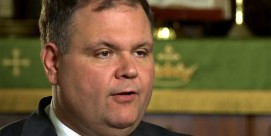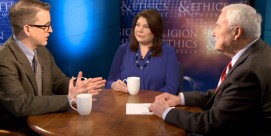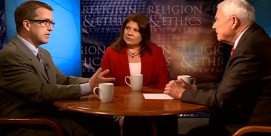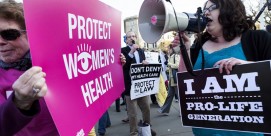In This Episode << SLIDE LEFT TO SEE ADDITIONAL SEGMENTS
Shaun Casey Extended Interview
Read more of Lucky Severson’s interview with ethics professor Shaun Casey about evangelicals and politics:
Many people categorize all evangelicals as being one way, but that’s not necessarily true, is it?
Evangelicals are incredibly diverse. That’s what makes them so fascinating to study. They’re located all across the country. One friend of mine says it’s like trying to herd cats. They are geographically, ethnically, and theologically diverse. And their churches tend to be decentralized. There is no one place you can go, no one person you can talk to who represents all evangelicals.
But there must be some positions and descriptions that would be fairly accurate for them. You could almost bet that evangelicals are opposed to abortion.
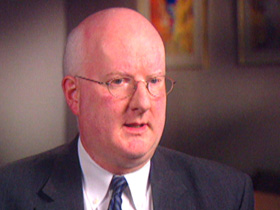
For the most part, that’s true. But some surveys show that there are nuances to that position. There are some people who fall in the middle of the American population, who are, on the one hand, uncomfortable with unrestricted access to abortion, but who are, at the same time, uncomfortable with restricting all abortions. So there is some diversity of opinion there, but certainly the preponderance of evangelicals, I think, are against abortion in some form.
How about gay marriage?
There I think you find some interesting things. On the whole, I think most evangelicals are against gay marriage, but the more interesting question then is: How should society respond to the recent raising of that issue? I think there is tremendous ambivalence among evangelicals as to what to do. For instance, some surveys show that only about half of evangelicals support a constitutional amendment to ban gay marriages. To me, that shows some ambivalence as to how society ought to respond legally to this question. Even though, on the whole, I think evangelicals are probably against gay marriage, they’re not sure how to respond to it.
On a list of priorities, you don’t think that gay marriage would be number one or two?
No. In fact, I think surveys show that, other than some general unease about the state of moral values in America, the issues that concern evangelicals look an awful lot like issues that the average American is concerned about: the economy, Social Security, the viability of Medicare, the war in Iraq. In that sense, evangelicals are very mainstream America, I think.
Let me ask about a couple of issues. Where do you think most evangelicals come down on tax cuts?
I don’t think evangelicals stray very far from the American mainstream on that. I think some of them support tax cuts. On the other hand, I think some of them are deeply troubled by rising deficits. Like most Americans, they understand that you really can’t have both. You can’t continue to maintain government services at a certain level and cut taxes at the same time.
The environment?
By and large, I think evangelicals are less concerned with the environment, although those evangelicals who are concerned about the environment are very passionate about it. That’s an interesting contradiction. When you find evangelicals who care about the environment, they care for theological reasons. They believe that God has created the known world, the physical world, and that we are to be stewards of this. And in fact, we have not been good stewards.
And is there a growing movement of evangelicals who are responding to the Kyoto Treaty?
Absolutely. A couple of years ago, there was this movement, “What would Jesus drive?” which was an anti-Detroit campaign organized by evangelicals and directly targeted to evangelicals to raise some of these fundamental environmental issues as Christian issues, as theological issues. It was very interesting that it was evangelically driven.
I think most Americans would assume that most evangelicals are, or were, supportive of the war in Iraq. Would that be correct?
I think most of them were. However, I think it’s wrong to say that all of them were. Back about six months before the war started, there was a group of a hundred Christian ethicists who maintained a petition campaign against the war. If you look at the signatories, of that hundred, probably a third had evangelical connections. They either taught at evangelical schools or they themselves were evangelicals teaching at other kinds of institutions. So it’s wrong to assume that all evangelicals were pro-war. You’ve got to remember that a significant number of evangelical traditions are pacifist in heritage. Many evangelical groups were unable to come to consensus over the war, because you had a significant but small percentage of evangelicals who were pacifist, so they are against the war.
Karl Rove, the president’s political advisor, says that there were four million evangelicals who didn’t vote in 2000, and they want those votes this time. Are you saying that the Republicans can’t necessarily take evangelical votes all for granted?
This is the fascinating question as we are going into this presidential race, because evangelicals present both peril and opportunity for both parties. Karl Rove is fond of saying that four million evangelicals did not turn out and vote last time. I think you can parse that in a number of ways. If you look at how President Bush reached out to evangelicals in the 2000 race, he chose not to go the red meat route. He didn’t pursue hot button rhetoric. He didn’t do the culture war talk that other people had done in other Republican campaigns. He chose rather to target specific religious-based media, for one. And when he talked about “values” in mainstream media, he used a much softer kind of rhetoric. He talked about being a uniter, not a divider. He wanted to restore respect and dignity to the White House office. He talked not about abortion, not about being against gay marriage per se, but he spoke in a milder code that signaled he knew evangelicals. He walked their walk, talked their talk. It may be that that softer rhetorical line didn’t move those four million people out of their chairs to the polls. Maybe you have to breathe fire to move some of those people on the right. The downside to that strategy is that, if you do it, you’re going to alienate moderate voters who are going to see that kind of culture war rhetoric as divisive and off-putting. That may drive moderates, undecideds into the other camp.
On the other hand, if you’re John Kerry or the Democrats at this point, historically the upside is that you’re not Al Gore. You don’t have the albatross of your relationship with Bill Clinton and the problems he had in his personal life, which alienated so many evangelicals. Since Gore didn’t repudiate him, he had to carry that burden with him. And that put off a lot of evangelicals in 2000. But if you’re John Kerry today, you don’t have that burden.
Historically, the Democratic Party has had a really tin ear for evangelical Christianity in this country. It’s deeply ironic, because if you look at who has run and who has been elected president, it’s the Democrats who had the real evangelicals who have won the White House: Jimmy Carter, Bill Clinton twice; and Al Gore at least won the popular vote in 2000.
So there are upsides and downsides to both parties as we face this election. If you look at survey data, about 70 percent of white evangelicals say they’re either Republican or they lean Republican. About 23 to 24 percent say they are Democrats or lean Democratic. That’s a larger number, I think, than most people assume. Certainly, most Democratic candidates don’t realize that about a quarter of the electorate among white evangelicals is already in their camp.
So it would behoove the Kerry campaign to do a little more courting of evangelicals? There might be more votes out there than they are thinking?
Absolutely. In a polity that is so deeply, evenly divided as ours, I don’t think you walk away from any constituency or ignore them, but unfortunately that’s been the history of the Democratic Party.
You said that evangelicals helped elect Bill Clinton two times?
I think that’s right. Clinton was able to recover a significant percentage of evangelical voters who had voted for Ronald Reagan, for instance, in ’80 and ’84. They came back to the Democratic Party because, at least initially, they perceived Clinton as being an evangelical himself. Now, he took some policy stances that deviated from the mainstream of evangelicalism, but he was a southerner, a Southern Baptist. He knew their lingo and their culture. And he was able to win back some of those folks to the Democratic Party.
I interviewed an evangelical, neoconservative congressman a few weeks ago. He said that the Bush administration is the most religious administration in this last century. Would you agree with that?
It depends what you mean by “religious.” At a rhetorical level, Bush’s speeches are probably on a par with Bill Clinton’s in terms of their religious references and their outreach to specific religious groups. I think one gets the picture from the ethos of the workings of the White House that there are more evangelical Christians working on the inside of this White House perhaps than at any other point in America’s history. To that extent, it may be the most Christian administration that we have seen. In terms of actual outreach to religious constituencies, I think that’s a harder case to make. I think this White House has reached out to its base, to evangelical Christians. It has tried to reach out to African-American clergy, with mixed success. And it has reached out to the Muslim community quite effectively. So to that extent, they have had some success. If you go back and look at the Clinton White House, I think they were very deft at reaching out to a broad range of religious groups across a pretty amazing spectrum.
What do you see so far in the Kerry campaign?
It’s really too early to tell. It’s been very interesting that there have been a lot of stories recently about Kerry’s Catholicism and the controversy about his relationship with various bishops and whether he can take Communion or not. He has shown some ability to demonstrate the fact that he is a practicing Catholic. He goes to Mass regularly. He takes Communion wherever he seems to go. He has spent some time in black churches, which is a traditional Democratic enclave. The unknown at this point is to what extent he’s going to be able to reach out to evangelicals, or even to mainline Protestant camps, with any kind of effectiveness, with any kind of skill. It’s too early to tell if he’s going to be able to do that.
Another thing this congressman said is that you’re going to see evangelicals out campaigning for George W. Bush like never before; that they think this choice is stark and important, and they are going to be a factor.
You’re certainly going to see evangelical politicians and evangelical leaders doing that. The real question is, can they motivate the base to actually turn out? There are a number of reasons to withhold judgment on the success of that. Again, I would argue that evangelicals are nervous about where this war is going. They’re nervous about this economy. If you look at the 18 so-called swing states that both campaigns are focusing on, where in 2000 the margin of victory for either candidate was so narrow, some of those states have very interesting religious demographics. You go to Florida, to Michigan, to Missouri, for instance, and there are very significant Catholic populations, significant mainline Protestants, but very interesting evangelical populations. These are states where the economy has suffered. These are places where President Bush’s popularity apparently has slipped in the last three years. What will be interesting to see will be if evangelicals are moved to vote for the president, or if their current ambivalence among the so-called persuadable voters moves them into the Kerry camp. I don’t think it’s a foregone conclusion that they’re all going to be turning out and voting for the president again this time.
How important is being involved in politics to the evangelical community? Has it become more important to get out there and get involved?
I think there is a deep ambivalence in the white evangelical community today about how to be involved politically. The abortion issue is a classic case. For the last 25 years, evangelicals have believed that abortion should be outlawed, that ROE V. WADE should be overturned. And for 25 years, they have gone to the Republican Party saying, “Hear our plea, hear our cry.” And the Republican Party, on the whole, has said, “We are where you are.” But at the end of 25 years, you’ve got to ask yourself, what really has changed? The truth is, ROE V. WADE is still in force. Abortion is still open and accessible to most Americans who want to choose that option. It has not made a radical difference in the actual law in this country. I think a lot of evangelicals are tired, frankly, of being taken for granted by the Republican Party.
There is a sense in some evangelical camps that national electoral politics is a dangerous place for the church to be; that when Caesar shakes hands with the church, it’s Caesar that maintains the tighter grip; that there is more to be lost than to be gained on the part of the church. So there are a number of evangelicals who want to opt out of that process, some of whom never entered into national electoral politics. On the other hand, in the last 25 years, a lot more evangelicals have jumped in with both feet. So it’s a mixed bag. I think there is still some ambivalence in the minds of many evangelicals about whether or not they should be investing their time and energy in those pursuits, as opposed to other sorts of Christian outlets. But certainly the amount of participation by evangelicals has increased in electoral politics in the last 20 years.
Historically it seems as though we have more involvement in religion today than in a long time.
It really began in the campaign of 1960, when John Kennedy ran against Richard Nixon. For the first time, the Republican Party turned to evangelicals and said, “For religious reasons, you need to vote for us and against John Kennedy, because if a Catholic becomes president, you’re going to lose religious freedom, which we hold so dear here.” The Nixon campaign had a very sophisticated outreach to a number of evangelical leaders in that election and brought them into the inner circle, really for the first time in American political history. There was an extensive effort to reach out to fundamentalist and evangelical white voters, in the South in particular, to prey on the latent anti-Catholicism that had been there for generations. That began this relationship between the Republican Party and evangelical Christians, which has since multiplied in the 25 years afterwards. But I think that 1960 moment was the time at which a lot of evangelicals who had no commitment to national politics were drawn in. And interestingly, it was an oppositional move, an attempt to preserve American religious freedom, to oppose the threat that they thought Catholicism posed. If you trace the history of the next 25 years, it’s that oppositional mode sometimes which is so effective in mobilizing evangelicals. You mobilize them to oppose pornography, to oppose the Equal Rights Amendment, to oppose abortion. It seems if you’re trying to get evangelicals energized, it’s by holding up a threat to them. That seems to be the most effective tool. That makes it difficult in contemporary times if you’re a Republican president and have a Republican-controlled Congress, because if you’re opposing something, in theory the good guys are already in charge. It makes it much harder in that environment, when you’re in power, to run the kind of campaign that attracts the politics of opposition.
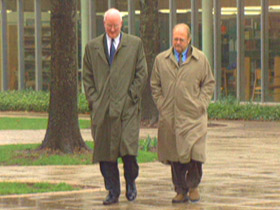
Among evangelicals, is there concern about the separation of church and state?
I think there is some concern about that. On the other hand, you do hear a lot of leaders talking about prayer being banished from schools — that prayer needs to be restored, and God is being driven out of the marketplace so that we have this naked public square. Again, that’s an appeal to the fear factor among evangelicals. This is part of the double-mindedness among evangelicals today. Surveys show that evangelicals, on the whole, feel like they are part of mainstream America. They really feel like they’re part of Main Street American culture and experience. At the same time, evangelicals will say they feel like their values are under assault, or that their moral views are on the margins of society. If you turn on the television, evangelicals are rarely portrayed in a positive light there. You rarely see evangelicals in the mainstream media in positions of leadership. So there is this tension or ambivalence in the evangelical mind that, on the one hand, “We want to see ourselves,” they say, “as being in the mainstream, representing mainstream American values”; but on the other hand, there is this feeling, “We’re always under assault for what we believe.” You find tension between those two poles and sometimes gravitation back and forth between them.
Evangelicals voted for Ronald Reagan twice, didn’t they?
I don’t know. It would be interesting to go back and look, because Jimmy Carter, of course, was an evangelical. In ’76, he attracted a lot of them, because he was really the first contemporary evangelical to run for president. In terms of the 1980 vote, I couldn’t tell you. Certainly, by ’84, against Walter Mondale, I think you could argue that the evangelical vote had, in fact, turned to Ronald Reagan. My hunch is that 1980 was much more evenly divided.
People assume Jerry Falwell and Pat Robertson represent the mainstream of evangelicals. That isn’t necessarily true, is it?
That is correct. In fact, your own survey shows a fair amount of ambivalence among white evangelicals towards those two figures in terms of favorability rating. The pope has a similar, or better, favorable rating among white evangelicals than those two, which is astonishing.
Has George W. Bush lived up to evangelical expectations, would you think?
I think in the minds of some he has not, certainly on a number of social issues. There has been no real progress on abortion.
He got the so-called partial-birth abortion ban.
Right, but in empirical terms, nobody can give a number of how many of those abortions are actually performed in a year in America. To the extent anybody has put up a number, it’s a tiny fraction of the overall number of abortions performed in America. So its value is more symbolic; it’s not really a significant victory for antiabortion folk in this country. In terms of being a uniter, not a divider, there certainly has not been much progress on that. Washington remains as deeply divided on a partisan [basis] as perhaps [at] any time in recent memory. The war certainly has caused some ambivalence. I think a lot of evangelicals supported the war, thinking that our troops were going to be welcomed as liberators when they came into Baghdad. And here we are, a year later, and the war is getting worse. We’ve had 600 American deaths and almost 3,000 wounded. There is some ambivalence and nervousness there. And the economy has not improved. Evangelicals, who are mainstream Americans in the sense that their income level seems to put them pretty much in the middle of American society, have felt the disappearance of jobs. They have felt the decline in manufacturing. They have felt all of the fallout in some of these key states. The real question becomes, to what extent does the economic downturn trump some of these hot button values issues? It remains to be seen. It’s not clear how that’s going to play out when evangelicals enter the polling booth.
Is there any feeling among evangelicals that they’re beginning not to trust President Bush?
I think the whole question of the credibility of the president cuts across all levels of American society. Again, it’s too early to say that evangelicals have turned against this president because of his credibility problem. What it does say is that this election is a toss-up at this point, and that there is a significant percentage of evangelicals who are now willing to take a look at the other guy in a way that three years ago was probably not conceivable. The assumption would have been that the evangelicals will be completely behind this president. I think that’s up for grabs at this point.
Do you think it’s appropriate for politicians to equate their religious beliefs with their political outlook and to act on them?
I think it’s completely appropriate for a presidential candidate to explain to the American people how his or her religious beliefs shape their policy. Particularly if a candidate is going out to religious constituencies and saying, “Vote for me,” I think it’s completely fair for Americans to ask, “Tell me a little more about your beliefs. How did you get here? How does your particular form of piety shape who you are as a politician?” I don’t think politicians are particularly skilled in connecting those dots. Many times politicians of both parties look at constituencies as potential voters, not necessarily as people they need to explain themselves to. I have no problem whatsoever with political figures connecting the dots between their own theological beliefs and their policies. I think they owe that to voters, if in fact there is a connection.
Do you think that evangelical involvement in politics has altered their religious or theological views at all?
I guess it has some. Compared to 40 years ago, many evangelicals feel their values ought to be in play in shaping the national ethos. Forty, 50 years ago, a lot of evangelicals did see themselves — and perhaps rightly so — on the margins of American society. They were more interested in simply living their own lifestyle and less concerned about global issues and national issues. Certainly there has been an increase of influence on the politics of the day as evangelicals are drawn more and more into the political fray.
I’ve read that probably there is no more influential bloc of voters than evangelicals when it comes to this administration’s foreign policy; Israel, for example. Do you agree with that? Or do you think it’s overstated?
I think that’s there. Certainly, evangelical support of the state of Israel — and there are a host of theological reasons for that — has had an impact. Perhaps in a less well-known way, countries like Sudan I think are now on this president’s radar screen in a way they would not have been, had not specific evangelical voices held up Sudan as a country of concern. I think the whole issue of international religious freedom is one that was born in the ’90s and was primarily driven by a handful of evangelicals. Now it is a mainstream human rights issue. We have a State Department office devoted strictly to international religious freedom. We have an independent U.S. commission on international religious freedom that brings together a broad coalition of religious voices in America. Interestingly, this issue had resonance with Bill Clinton, I think, because he was an evangelical. So there are many ways in foreign policy where the evangelical presence has in fact made a difference, I think.
Can it be counterproductive? I’ll give as an example the security wall in Israel. While I was there recently, there were representatives of evangelical groups out in these settlements pushing the wall and saying, “Don’t worry about the administration’s position, this is the right thing to do.” It may not be the right thing to do, at least certainly not in the near term. It could exacerbate more violence.
That’s really the open question — to what extent some of the evangelical leaders who support Israel so vociferously, how open are they going to be to the compromises that are going to be inherent in any kind of real peace settlement? How are they going to view Palestinian rights? I think that’s an open question at this point. It’s a question that needs to be answered. My hope is that the evangelical leaders who push American support for Israel will be equally eager to nudge the peace process along in a way that’s going to have to happen in terms of compromise, where Palestinian rights are taken seriously. That’s a huge, complicated nexus of issues. And it’s not clear to me that evangelical leaders who support Israel so strongly are going to manifest the same level of energy for a peace settlement that involves compromise. It’s just not clear where that’s going to go.
Christ was always saying that you should look out for the least amongst you. Certainly, in the Israeli-Palestinian conflict, the Palestinians are “the least.” With our economic policy in this country, some people think if you aid those who have the most money, the money will trickle down to those who need it the most. Is there any kind of conflict [among] evangelicals on that?
Absolutely. I think there is a network of progressive evangelicals for whom poverty, and the relief of poverty, both domestically and globally, is the central political issue that comes out of their theology. These progressive evangelicals are increasingly uncomfortable with this president. In the last three years, poverty has gone up in America almost 10 percent. We have almost 35 million people living below the poverty line. The gap between rich and poor globally has never been wider than it is now, and it has grown in the last three years. That, I think, is part of the evangelical critique of this administration: that politically it has not made good on some of its promises to deal with the problem of poverty. The president’s whole faith-based initiative, his willingness to bring churches into the federal social service provision network in a greater way, attracted a lot of moderate and progressive evangelicals before the election. Now, after three years, there is a growing sense of discontent that, while he has done some things through executive orders, he has not been able to expand that program and bring new money into the federal social service provision network to some of these faith-based organizations. They are upset with that. They are frustrated that he hasn’t made progress on what seemed to be a central issue of his campaign when he first got elected.
Do you think evangelicals who have not seen as much progress on domestic issues as they would like are putting more emphasis on foreign policy issues?
I still believe that domestic issues are primary in the minds of most evangelicals. If you look at the issues that concern them most, it’s the decline of moral values in America, the loss of jobs, the overall downturn in the economy, the lack of access to quality health care, Social Security. It seems like domestic issues still dominate their thinking. Iraq, for instance, in your own survey, is sixth or seventh on the list of the most pressing issue in the minds of evangelicals.
If you are a religious conservative, that you will also be a political conservative?
No. That’s what makes this such a fascinating subject. Certainly, the majority of evangelicals who are conservative theologically, by definition, tend to vote conservatively. There is a correlation. Yet a significant number move into progressive politics. It’s that strain of folk that I find particularly interesting. Go back to the civil rights movement, for instance. There were people like Clarence Jordan in Americus, Georgia, who established the interracial Koinonia Farm. Out of their vision of what New Testament discipleship was supposed to be about, they felt compelled to address race. You have groups like Call to Renewal today, founded by evangelicals. They have tried to bring together a number of Christians across a wide theological spectrum to address poverty as a central Christian concern. So the quick answer is no; the not-so-quick answer is to say, yes, most of them do tend to vote conservatively, but there is a significant number of conservative Protestant Christians in America today who see themselves as moderates, or see themselves as progressive politically. It would be remiss not to note those folks.
How big a factor are Hispanic evangelicals?
That’s really hard to tell. It’s not clear that they’re going to be decisive, but certainly, if demographic trends continue, it’s only a matter of time in places like Florida, Texas, New Mexico, maybe Arizona and California; their vote is going to become increasingly crucial. The Hispanic vote as a whole is becoming extremely crucial. Now, what slice of that can actually be called an evangelical vote, I don’t think is clear at this point. But they certainly bear watching. I think they’re going to be increasingly influential in a very short period of time.
You mentioned that the president has not really been the unifier so far that he spoke of being. Isn’t it possible that, with so much religion in the air, in some ways it has become a divisive factor?
That’s possible. I think what has complicated his task has been the war. It’s difficult to call oneself a war president at the [same] time as trying to be a prewar uniter. Part of the rhetorical strategy of this administration has been: if you’re not with us on the war, then you’re against us. That immediately divides the country. Now, initially, the country supported the move to go into Afghanistan and also into Iraq. Those numbers have now changed. There is a deep ambivalence in American society over the viability of this war in Iraq. Religion is not going to be a tool that’s going to help you paper over that difference. Until we come to some kind of resolution in Iraq, religion is not going to help a president of whatever party to unite the country completely. It may be that we’ve become too diverse and too pluralistic in our society to see religion as the thin veneer that unites us all. There was a day when scholars talked about “civil religion” — a sort of non-Christological theism; in other words, invoking God as creator, God as sustainer of our country. You didn’t hear people talking about God as the redeemer of our country, or Jesus as the sustainer of our country. It may be that we are so diverse now that that thin language of civil religion can no longer be the platform that brings the “unum” out of the “pluribus.” It remains to be seen how a president can govern a country that is increasingly as diverse as ours. Religion is a source of division at some times. It’s not clear if religion will serve as it used to, as a thin veneer that united the whole country because it presumed a certain set of Christian assumptions. As we become more pluralistic as a country, you can no longer assume there is that kind of unity of belief across this wide spectrum of American citizens. It remains to be seen.
People talk about the lack of civility on Capitol Hill in Washington. Is it possible that, because of the efforts of the Christian right, of evangelicals, that issues have changed to being about good or evil, and that really raises the stakes and somehow makes the end justify the means?
It’s one of the sad ironies of Washington that on the Hill there is probably more public display of piety that at any other point in the history of the republic, and yet there is more personal animus between members of Congress across the aisle than in recent memory. To me, that’s tragic, whether you’re a liberal or conservative, or you’re religious or irreligious, that you can’t find within yourself a way to reach out across some of the political and religious divides on the Hill. It’s sad to me, at least theologically, that the faith that is so deeply and dearly held on both sides of the aisle has not allowed people to bridge some of these gaps, but has fed it at times. I think that’s absolutely tragic.
I spent some time a few weeks ago with Ray Flynn. I was asking him about the Catholic Church, and particularly Archbishop Burke’s decision to deny Communion to candidates like Kerry. He sort of pooh-poohed it. He said, “Listen, we’ve never had less influence.” It’s almost like Catholics getting lost, with all the influence of evangelicals. What do you think of that whole phenomenon and what’s happening in the Catholic Church?
I think this is a very fragile time for the leadership of the Catholic Church in the United States. Obviously, the clergy sexual misconduct scandal has deeply undermined the leadership’s standing within the Catholic Church itself, but also in the wider society. It’s not clear if they’re going to be able to recover their voice anytime in the short run. I think that’s sad, because, frankly, on the war, for instance, the Catholic Church had a very sophisticated, nuanced, deeply held, moral, Christian position of opposition to that war. And basically it got very little currency in the media, because it was being stomped by the larger scandal story. Catholic institutions in this society are providing help to the poor and marginalized. Catholic Charities are continuing to do their work on the ground. It’s not clear if the institutional Church itself is going to recover the kind of public voice it had back in the ’80s and the ’90s. Certainly, it can make a great contribution to the common good in this country. It’s not clear to me if they’re going to know how to get back on track. At the same time, both political parties don’t know how to relate to that hierarchy today. Obviously, John Kerry has a very ambivalent relationship to a couple of bishops at this point. I think this White House has distanced itself some from the Catholic leadership in the last three years, given some of the public scandal as well. They seem to be reaching out to a set of neoconservative Catholic intellectuals. I don’t see that they have developed a strategy of reaching out beyond that small subset. This is where the rhetoric of compassionate conservatism helped them in 2000. It helped Bush reach out to persuadable Catholics. It helped him maintain his evangelical base. And it helped him reach out to some African Americans. You don’t hear the president talking about compassionate conservatism anymore. I think it’s tough to hang on to that at the same time you’re saying we’re on a war footing. Somehow, those two messages don’t hold together. Compassionate conservatism has fallen out of the rhetorical arsenal at this point. I don’t think either political party knows how to relate to the Catholic Church. It remains to be seen how that’s going to play out.


